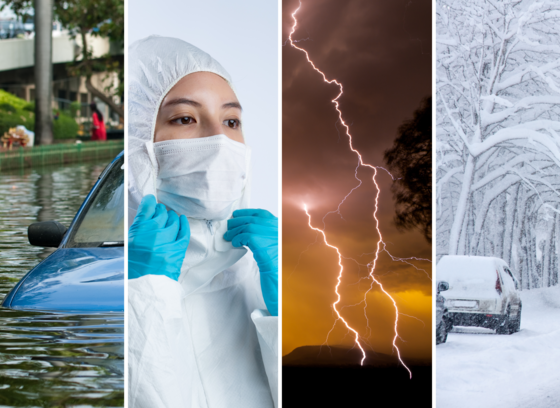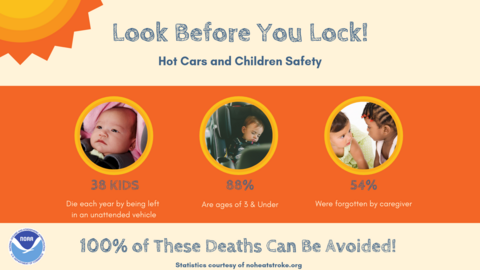Public Health Preparedness Program
Mission: To prepare and respond to natural and man-made public health emergencies including, but not limited to:
- severe weather conditions
- bioterrorism
- disease outbreaks
- radiological/nuclear hazards

Each month HCHD will bring you information and resources about different hazards and how to be prepared to respond.
In Howard County:
-
From 1994 to 2019 six (6) significant Lightning events
-
From 1950 to 2019 thirteen (13) named Cyclones and one (1) that reached Hurricane strength
-
From 1975 to 2019 seventeen (17) Tornadoes
-
From 1969 to 2011 (115) Wind-Storm (Thunderstorm)
-
On June 21, 2016, a tornado touched down in western Howard County. The tornado traveled nearly 13 miles and left a path of debris over 500 yards wide.

- Determine Your Risk:
- Howard County has a history of thunderstorms, lightning, hurricanes, and tornados. You can find detailed information on natural hazards risk in Howard County in the Community Hazard Handbook.
- Up-to-date weather information for your area can always be found on National Weather Service Website.
- Strengthen Your Home & Gather Supplies
- Get Tech Ready and Watch the Weather
- Make a Plan and Take Preventive Action
- Keep your cell phone charged when you know inclement weather is in the forecast and purchase backup charging devices to power electronics.
- Download the FEMA app. Get weather alerts from the National Weather Service for up to five different locations anywhere in the United States.
- Sign up for you community’s warning system.
- Wireless Emergency Alerts (WEAs)
- NOAA Weather Radio All Hazards (NWR)
- Everyone in your household should know and understand your plans.
- Include the office, kids’ day care, and anywhere else you frequent in your plans.
Thunderstorms & Lightning:
- Cut down or trim trees that may be in danger of falling on your home.
- Consider buying surge protectors, lightning rods or a lightning protection system to protect your home, appliances and electronic devices.
Hurricanes:
- De-clutter drains and gutters.
- Bring in outside furniture and other outdoor items that could blow away.
- Consider hurricane shutters to protect your windows.
- Have enough supplies for your household in your go bag or car trunk, including medications, disinfectant supplies and pet supplies.
Tornadoes:
- Identify and practice going to a safe shelter for high winds, such as a safe room built using FEMA criteria or a storm shelter built to ICC 500 standards.
- FEMA hosts the Safe Room Helpline, responding to inquiries concerning FEMA’s safe room publications and guidance. Inquiries can be sent to Saferoom@fema.dhs.gov or made by calling 866-927-2104.
Thunderstorms & Lightning:
- When thunder roars, go indoors!
- Protect your property.
- Never lie flat on the ground.
- Turn Around. Don’t Drown!
- Remember 30-30 rule: After you see lightning, start counting to 30. If you hear thunder before you reach 30, go indoors. Suspend activities for at least 30 minutes after the last clap of thunder.
https://www.weather.gov/safety/lightning-indoors
Hurricane:
- Go to your basement or an inside room, without windows, on the lowest floor.
- If outside, go to a low-lying area such as a ditch and lie flat. Protect your head and neck with an object or with your arms.
- If you live in a mandatory evacuation zone and local officials tell you to evacuate, do so immediately.
- Locate the nearest shelter and different routes you can take to get there from your home. If shelter locations in your area have not been identified, learn how to find them in the event of a storm.
https://www.cdc.gov/disasters/hurricanes/be-safe-after.html
Tornado:
- Do not try to outrun a tornado in a vehicle. If you are in a car or outdoors and cannot get to a building, cover your head and neck with your arms and cover your body with a coat or blanket, if possible.
- Don’t stay in a mobile home during a tornado. Mobile homes can turn over during strong winds.
- If you don’t have a basement, go to a small interior room, closet, or hallway on the lowest level during the storm
https://www.cdc.gov/disasters/tornadoes/during.html#taking-shelter
- Pay attention to authorities and weather forecasts for information on whether it is safe to go outside and special instructions.
- Be careful during clean-up. Wear protective clothing and use appropriate face coverings or masks if cleaning mold or other debris.
- Save phone calls for emergencies. Phone systems often are down or busy after a disaster. Use text messages or social media to communicate with family and friends.
- Document any property damage with photographs. Contact your insurance company for assistance.
- Let friends and family know before you leave and when you arrive.
- Don’t drink the water. Bring water and non-perishable food. Avoid drinking tap water and flushing your toilets until you hear the “all clear” and you know that your sewer or septic system is in good working order.
- Photograph the damage. Take detailed photographs before you begin cleaning up. This can help your insurance company when they’re assessing the damage
- Do not touch electrical equipment if it is wet or if you are standing in water. Watch for fallen power lines and trees. Report them immediately.
- Do not wade in flood water.
- People with asthma and other lung conditions and/or immune suppression should not enter buildings with indoor water leaks or mold growth that can be smelled.
- Contact your healthcare provider if you are sick and need medical attention.
- Charge devices and consider getting back-up batteries in case power-outages continue.
- Fill up your gas tank and consider downloading a fuel app to check for outages along your route.
- Walk the perimeter. Take note of any out-of-place electrical wiring, gas smells, or loose debris that may fall. If you notice downed power lines or a gas smell, call your hydro or gas company before entering your house.
- When in doubt, throw it out. Food and drinks inside your fridge or freezer may need to be tossed when you return home — especially if your house lost power or was exposed to heat, ash, smoke, or any of the chemicals used to put out fires.
- Save receipts for additional living expenses. Keep receipts for transportation, stays at a hotel or rental property, and any other costs you wouldn’t normally face while living in your own home.
- Contact your insurance agent/company.
Be Prepared

Extreme heat can be dangerous after long periods of exposure, if proper precautions are not taken.
To protect yourself and your loved ones from the dangers posed by prolonged sun and heat exposure, follow the below tips:
- NEVER leave children or pets unattended in a parked car or other hot environment.
- If you must be outside in the heat, wear light-colored, lightweight, loose-fitting clothing, a hat and sunscreen.
- Stay hydrated. Drink water and caffeine-free liquids. Alcoholic beverages do not keep you hydrated.
- Take frequent rest breaks in air-conditioned or shaded areas if you must work or exercise outdoors. If possible, stay out of the sun during the middle of the day.
- Know the signs of heat-related illness, including: extreme weakness, muscle cramps, nausea, headache, vomiting, fainting, dry/red skin.
- Check regularly on infants, elderly, family and neighbors with health conditions as they are more vulnerable to heat-related illness.
- If planning a trip to the lake/beach/pool to cool off, be sure to review swim and water safety guidelines with your family and children
Additional Resources about Heat/Sun Safety:
- NHTSA Prevent Hot Car Deaths
- CDC Sun Safety
- American Academy of Pediatrics Drowning Prevention
- National Weather Service Heat Safety
Places to cool off on a hot day (contact location to verify operating hours before visiting)
- Howard County Library System Branches
- Howard County 50+ Centers
- Howard County Recreation & Parks Community Centers
- The Mall in Columbia
Anyone in need of shelter or other assistance should call the Grassroots hotline at 410-531-6677 or visit grassrootscrisis.org

How can YOU help in an emergency?
Become a Howard County Medical Reserve Corps Volunteer
The Howard County Medical Reserve Corps (HCMRC) Program is volunteer organization created in July 2002. Medical Reserve Corps (MRC) volunteers can be medical and public health professionals or community members with no healthcare background.
This organization prepares for and responds to extreme weather conditions, such as hurricanes, blizzards, and floods, as well as other emergencies affecting public health, such as disease outbreaks.
The MRC also plans community health activities that promote healthy habits.
For more information or questions, contact Patty Walcott at 410-313-7569 or via email.
Howard County Health Department
Phone: 410-313-6300
Maryland Department of Health (MDH)
Phone: 410-767-6500
After Hours Emergency: 410-795-7365
Maryland Emergency Management Agency (MEMA)
Phone: 410-517-3600
Centers for Disease Control and Prevention (CDC)
Phone: 800-232-4636